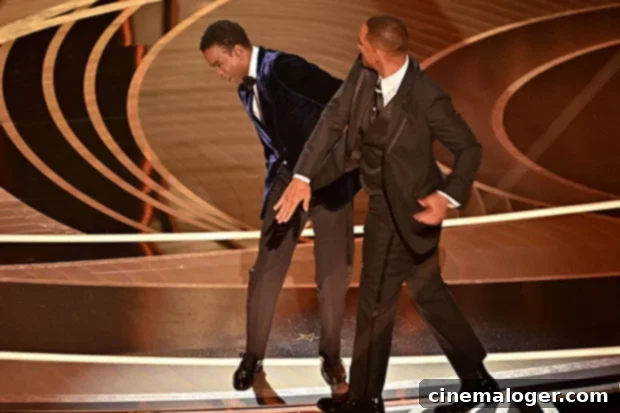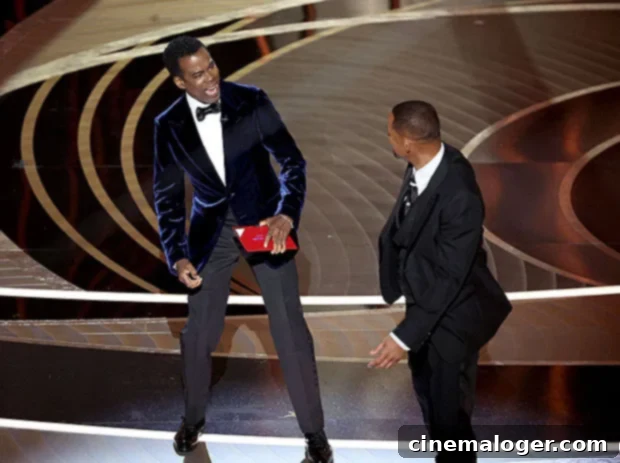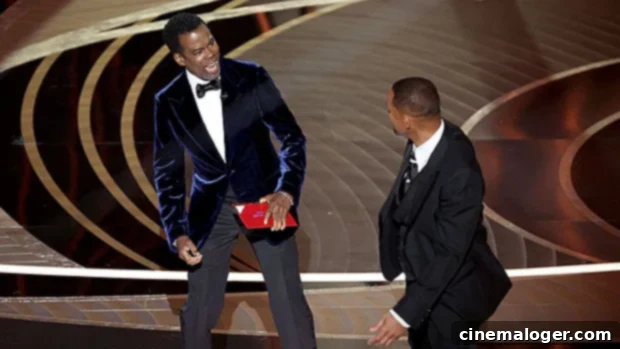Chris Rock Reveals Stance on Oscars Slap: ‘Not Talking Until I Get Paid’ – Exploring the Aftermath and Implications
In a candid moment during a recent stand-up performance, renowned comedian Chris Rock, 57, openly addressed the elephant in the room – the shocking incident at the 2022 Academy Awards where he was slapped by actorWill Smith. However, much to the audience’s intrigue, Rock made it clear that while he’s doing well, he has no intention of fully disclosing his thoughts on the highly publicized event until he receives appropriate compensation. This declaration has sparked widespread discussion, leaving many to ponder the various forms this “payment” might take and the broader implications for both Rock’s career and the entertainment industry.
Chris Rock’s Latest Remarks: “Life is Good, I’ll Talk When Paid”
During a comedy show in Indio, California, on April 8th, Chris Rock offered his most explicit stance yet on the controversial moment. When questioned by the audience about the incident, which occurred after a joke involving Jada Pinkett-Smith’s shaved head, Rock reportedly stated, “I’m OK, I have a whole show, and I’m not talking about that until I get paid. Life is good. I got my hearing back.” This lighthearted yet firm response, as reported by The Palm Desert Sun, indicates a calculated approach by the comedian to navigate one of the most talked-about events in recent entertainment history. His statement arrives amidst the ongoing fallout for Will Smith, who was subsequently banned from attending the Academy Awards for a decade.

The Infamous Oscars Slap: A Brief Recap
To fully understand the weight of Rock’s statement, it’s essential to briefly revisit the events of March 27, 2022. While presenting an award at the 94th Academy Awards, Chris Rock made a joke about Jada Pinkett-Smith’s shaved head, referencing “G.I. Jane 2.” Pinkett-Smith, who lives with alopecia, visibly reacted with an eye-roll. Moments later, Will Smith walked onto the stage, slapped Rock across the face, and returned to his seat, shouting, “Keep my wife’s name out of your f***ing mouth!” The incident sent shockwaves through the live audience, viewers worldwide, and the entertainment industry. Smith later won the Best Actor Oscar for his role in “King Richard,” delivering an emotional, albeit controversial, acceptance speech. The unprecedented nature of the event instantly became a global talking point, prompting debates on humor, assault, and celebrity accountability. It solidified its place as one of the most bizarre and unforgettable moments in Oscar history.
Processing the Shock: Rock’s Initial Public Reactions
Before his latest, more definitive declaration, Chris Rock had offered glimpses into his immediate post-slap state. Just three days after the incident, during a sold-out comedy show in Boston, Massachusetts, Rock addressed the elephant in the room for the first time. He told the eager attendees that he was “still processing” what had happened and indicated he wasn’t ready to delve deeply into the matter. “I don’t have a bunch of s— about what happened,” he reportedly said, explaining that he had already written his entire comedy set before the Oscars drama unfolded. He promised, “I’m still kinda processing what happened. So at some point, I’ll talk about that s–. So I’m gonna tell some jokes It’s nice to be out.”
A few days later, on April 5th, Rock made a surprise appearance at the Comedy Cellar in New York City. An audience member toldPage Six that Rock literally only addressed the situation as the crowd erupted for his unexpected presence. He reportedly said, “Lower your expectations. I’m not going to address that s–t.” These earlier remarks showcased Rock’s initial reluctance and a desire to regain control of the narrative, hinting that a more detailed account would come on his own terms and timetable.

Deconstructing “Getting Paid”: What Could Compensation Entail?
Chris Rock’s assertion that he won’t discuss the slap until he’s “paid” opens up a fascinating array of possibilities regarding what kind of compensation he might be seeking. This isn’t just about financial gain; it’s also about reclaiming agency, controlling the narrative, and leveraging a traumatic, high-profile event.
1. Exclusive Interview or Tell-All Special
One of the most immediate and likely interpretations is that Rock is waiting for a lucrative offer for an exclusive interview. Major networks, streaming platforms, or prominent talk shows would undoubtedly pay a premium for the first in-depth, no-holds-barred account from Rock’s perspective. Such an interview could command millions, offering unparalleled ratings and subscriber engagement. It would provide Rock with an unfiltered platform to share his emotional experience, his thoughts on Will Smith’s actions, and the lasting impact on his career and public image. This type of compensation not only involves money but also the power to shape the public’s understanding of the incident on his terms.
2. A Blockbuster Comedy Special
Chris Rock is first and foremost a comedian. The incident presents an unprecedented opportunity for him to craft a highly anticipated comedy special centered around the slap. Such a special, released on a major streaming service like Netflix (where he already has a strong relationship), could be a monumental event. The “payment” here would come in the form of a massive production deal and a guaranteed audience eagerly awaiting his unique comedic take on the controversy. This approach allows him to process the event through his art, transforming a moment of public humiliation into a powerful and perhaps healing comedic narrative. The financial success of such a special would likely dwarf any single interview fee.
3. A Civil Lawsuit Against Will Smith
While less common in high-profile celebrity disputes without severe physical injury, the possibility of a civil lawsuit against Will Smith cannot be entirely dismissed. Such a lawsuit could seek damages for assault, battery, emotional distress, and potential damage to Rock’s professional reputation or future earnings. While Rock has not indicated any current legal action, the phrase “getting paid” could refer to a settlement or judgment resulting from such a case. This would provide not only financial compensation but also a public declaration of wrongdoing through the legal system, potentially offering a sense of justice.
4. A Memoir or Book Deal
For a more comprehensive and personal account, Rock might be considering a book deal. A memoir dedicated to his experiences leading up to, during, and after the Oscars slap would allow for a deeper exploration of his feelings, thoughts, and the broader context of his career and personal life. Publishers would likely offer a substantial advance for such a highly sought-after narrative, providing both financial reward and the lasting legacy of his written word.
5. Increased Demand and Market Value
Regardless of any specific deal, the controversy has undoubtedly escalated Rock’s public profile and market value. His comedy tour dates sold out rapidly in the immediate aftermath, and his shows are now more anticipated than ever. “Getting paid” could also refer to the natural increase in his fees for performances, endorsements, and future projects as a direct result of the global attention the incident garnered. This is a more indirect form of compensation, where the controversy itself translates into significantly enhanced earning potential.
Ultimately, Rock’s phrase “getting paid” likely encompasses a strategic combination of these possibilities, all aimed at leveraging a difficult situation into a financially and professionally advantageous position. It reflects a shrewd understanding of media and celebrity economics, ensuring that when he does decide to speak comprehensively, it will be on his own terms and with significant reward.
Will Smith’s Consequences and Public Apology
While Chris Rock carefully considers his next steps, Will Smith has faced immediate and significant repercussions for his actions. Shortly after the slap, which occurred live on March 27, Smith released a public statement that included a formal apology to Chris Rock, the Academy, and all those he affected. Smith recognized the harm his behavior caused, stating, “My actions at the 94th Academy Awards were shocking, painful, and inexcusable.”
The consequences extended beyond a public apology. Smith later resigned from The Academy of Motion Picture Arts and Sciences, acknowledging that his actions were a breach of their conduct standards. Furthermore, The Academy’s Board of Governors subsequently announced its decision to ban Smith from attending all Academy events, including the annual Oscars ceremony, for a period of 10 years. Smith issued another statement, confirming he “accepted and respected” The Academy’s decision. These actions by Smith and The Academy highlight the severity of the incident and the industry’s attempt to restore decorum and accountability.
The Broader Implications and Future Outlook
Chris Rock’s strategic silence, coupled with his demand for compensation, adds another fascinating layer to the already complex narrative surrounding the Oscars slap. It underscores the commercialization of celebrity trauma and the immense value placed on exclusive personal accounts in today’s media landscape. For Rock, it’s not merely about recounting an event; it’s about monetizing his unique perspective on a moment that defined the cultural conversation for weeks.
This approach could set a precedent for how public figures handle similar high-stakes controversies in the future. It allows the individual to control the timing, platform, and ultimately, the financial benefit derived from sharing their story. As Chris Rock continues his successful comedy tour, audiences will undoubtedly remain on edge, eager for any new revelation or hint about when and how he will finally break his silence. Whether it’s through a record-breaking interview, a groundbreaking comedy special, or another yet-unforeseen avenue, one thing is clear: when Chris Rock decides to talk, the world will be listening, and he intends to be well-compensated for the privilege of his story.
